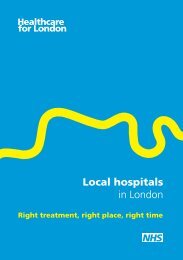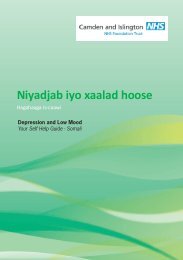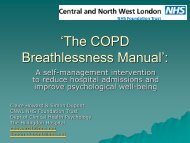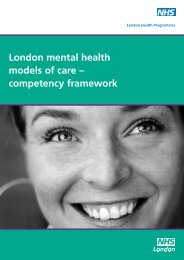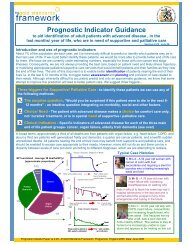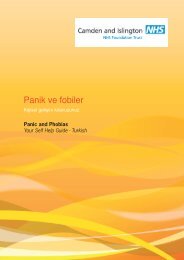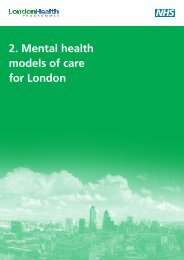- Page 1: Trauma: Who cares?A report of the N
- Page 4 and 5: ContentsAcknowledgements 4Foreword
- Page 6 and 7: AcknowledgementsThis is the twenty
- Page 8 and 9: AcknowledgementsThe organisations t
- Page 10 and 11: ForewordSevere injury - a car crash
- Page 14 and 15: Principal recommendationsOrganisati
- Page 16 and 17: IntroductionTrauma remains the four
- Page 18 and 19: IntroductionReferences1. Chaira 0,
- Page 20 and 21: MethodQuestionnaires and casenotesT
- Page 22 and 23: MethodQuality and confidentialityA
- Page 24 and 25: CHAPTER 1 - Data overviewFigure 2.
- Page 26 and 27: CHAPTER 1 - Data overviewMode of ar
- Page 28 and 29: CHAPTER 2 - Organisational dataTabl
- Page 30 and 31: CHAPTER 2 - Organisational dataTabl
- Page 32 and 33: CHAPTER 2 - Organisational dataTabl
- Page 34 and 35: CHAPTER 2 - Organisational dataTabl
- Page 36 and 37: CHAPTER 3 - Overall assessmentAll c
- Page 38 and 39: CHAPTER 3 - Overall assessmentKey f
- Page 40 and 41: CHAPTER 4 - Prehospital careRespons
- Page 42 and 43: CHAPTER 4 - Prehospital careFigure
- Page 44 and 45: CHAPTER 4 - Prehospital careTranspo
- Page 46 and 47: CHAPTER 4 - Prehospital careAdequac
- Page 48 and 49: CHAPTER 4 - Prehospital careIn 40/5
- Page 50 and 51: CHAPTER 4 - Prehospital carecaused
- Page 52 and 53: CHAPTER 5 - Hospital receptionIntro
- Page 54 and 55: CHAPTER 5 - Hospital receptionTable
- Page 56 and 57: CHAPTER 5 - Hospital receptionTraum
- Page 58 and 59: CHAPTER 5 - Hospital receptionTable
- Page 60 and 61: CHAPTER 5 - Hospital receptionThese
- Page 62 and 63:
CHAPTER 5 - Hospital receptionOvera
- Page 64 and 65:
CHAPTER 6 - Airway and breathingInt
- Page 66 and 67:
CHAPTER 6 - Airway and breathingFig
- Page 68 and 69:
CHAPTER 6 - Airway and breathingFig
- Page 70 and 71:
CHAPTER 6 - Airway and breathingTab
- Page 72 and 73:
CHAPTER 7 - Management of circulati
- Page 74 and 75:
CHAPTER 7 - Management of circulati
- Page 76 and 77:
CHAPTER 7 - Management of circulati
- Page 78 and 79:
CHAPTER 7 - Management of circulati
- Page 80 and 81:
CHAPTER 7 - Management of circulati
- Page 82 and 83:
CHAPTER 7 - Management of circulati
- Page 84 and 85:
CHAPTER 7 - Management of circulati
- Page 86 and 87:
CHAPTER 7 - Management of circulati
- Page 88 and 89:
CHAPTER 8 - Head injury managementI
- Page 90 and 91:
CHAPTER 8 - Head injury managementT
- Page 92 and 93:
CHAPTER 8 - Head injury managementT
- Page 94 and 95:
CHAPTER 8 - Head injury managementA
- Page 96 and 97:
CHAPTER 8 - Head injury managementT
- Page 98 and 99:
CHAPTER 8 - Head injury managementH
- Page 100 and 101:
CHAPTER 8 - Head injury managementC
- Page 102 and 103:
CHAPTER 8 - Head injury managementf
- Page 104 and 105:
CHAPTER 8 - Head injury managementT
- Page 106 and 107:
CHAPTER 8 - Head injury managementT
- Page 108 and 109:
CHAPTER 8 - Head injury managementF
- Page 110 and 111:
CHAPTER 8 - Head injury managementK
- Page 112 and 113:
CHAPTER 8 - Head injury management1
- Page 114 and 115:
CHAPTER 9 - Paediatric careOrganisa
- Page 116 and 117:
CHAPTER 9 - Paediatric careClinical
- Page 118 and 119:
CHAPTER 9 - Paediatric careKey find
- Page 120 and 121:
CHAPTER 10 - TransfersIntroductionM
- Page 122 and 123:
CHAPTER 10 - TransfersArrangement o
- Page 124 and 125:
CHAPTER 10 - TransfersFigure 52. De
- Page 126 and 127:
CHAPTER 10 - TransfersKey findingsR
- Page 128 and 129:
CHAPTER 11 -Incidence of trauma and
- Page 130 and 131:
CHAPTER 11 - Incidence of trauma an
- Page 132 and 133:
CHAPTER 11 - Incidence of trauma an
- Page 134 and 135:
CHAPTER 11 - Incidence of trauma an
- Page 136 and 137:
APPENDIX B - Injury severity scoreA
- Page 138 and 139:
APPENDIX C - Adult and paediatric G
- Page 140 and 141:
APPENDIX D - An example of an excel
- Page 142 and 143:
APPENDIX E - Level 1 trauma careAs
- Page 144 and 145:
APPENDIX F - ParticipationTrustCase
- Page 146 and 147:
APPENDIX F - ParticipationTrustCase
- Page 148 and 149:
APPENDIX F - ParticipationTrustCase
- Page 150 and 151:
APPENDIX G - Corporate structureThe
- Page 152:
Published November 2007 by the Nati







